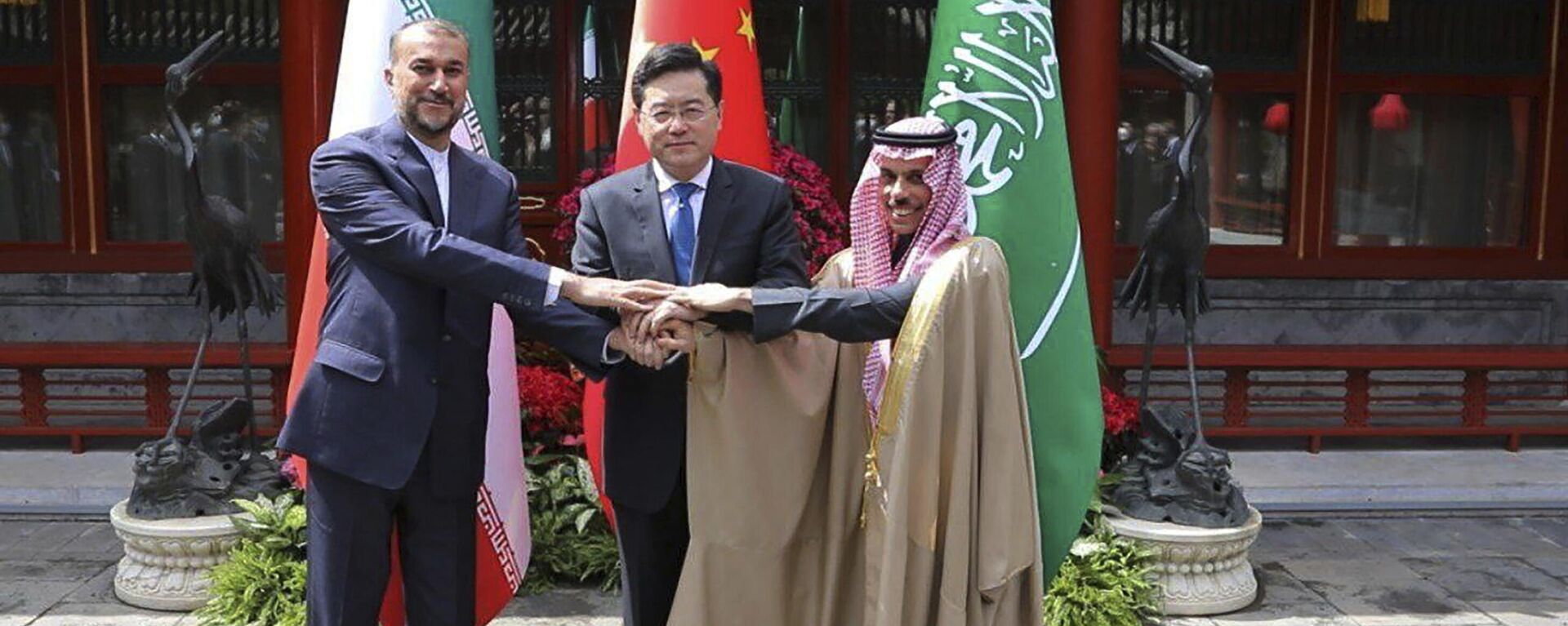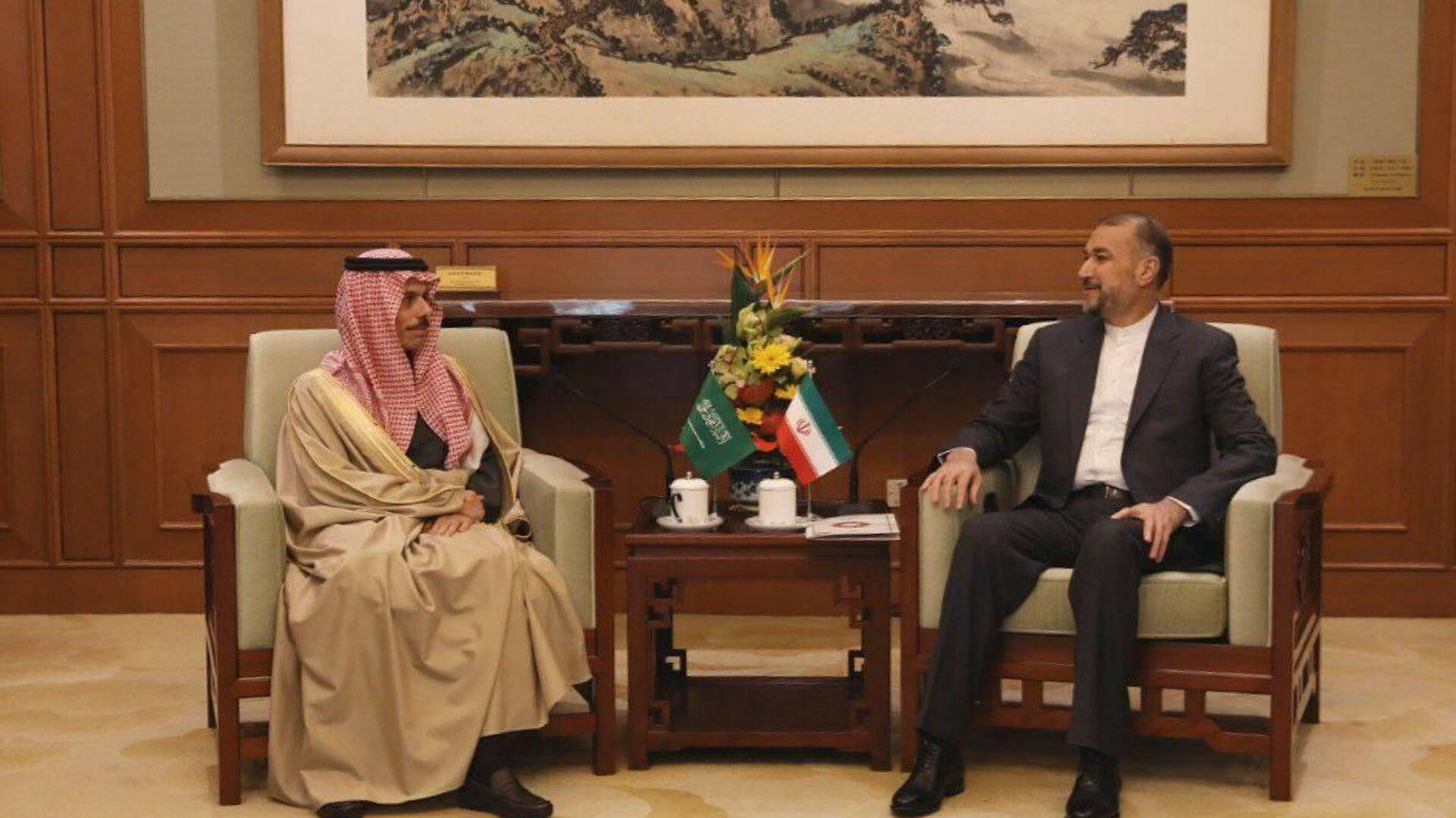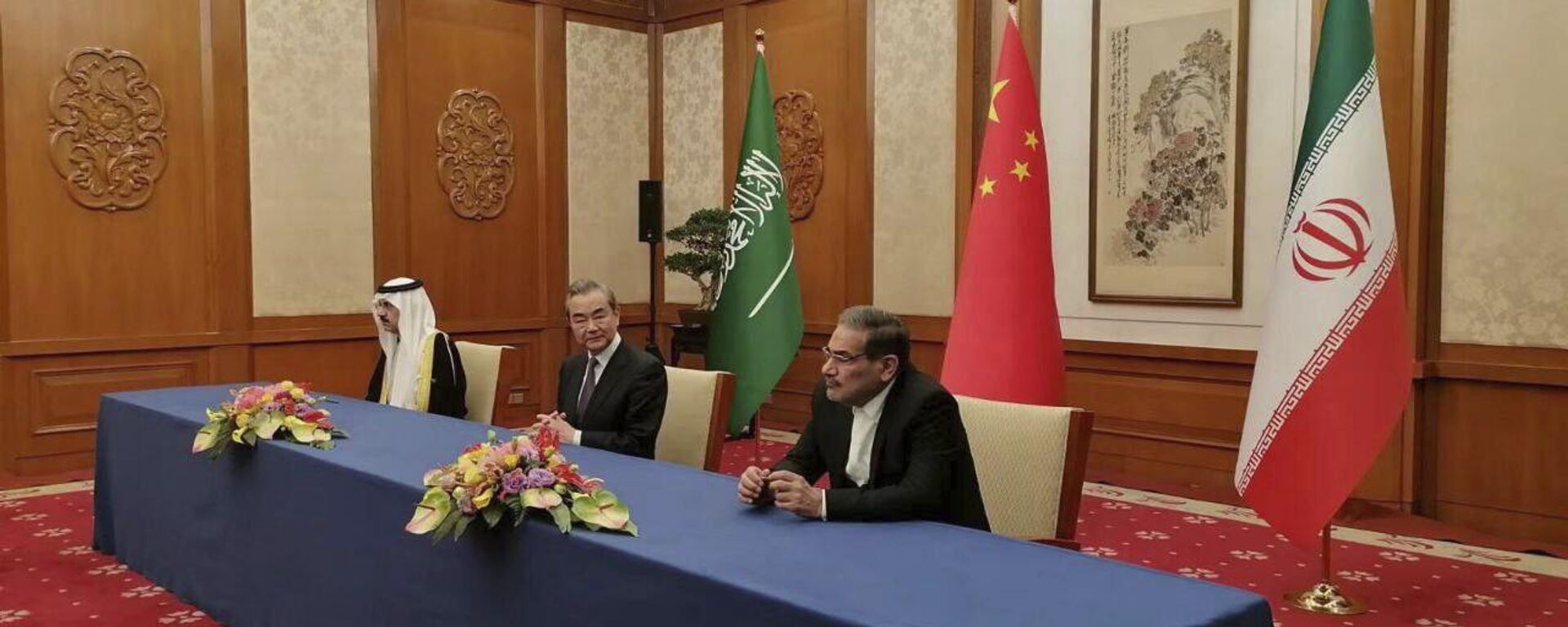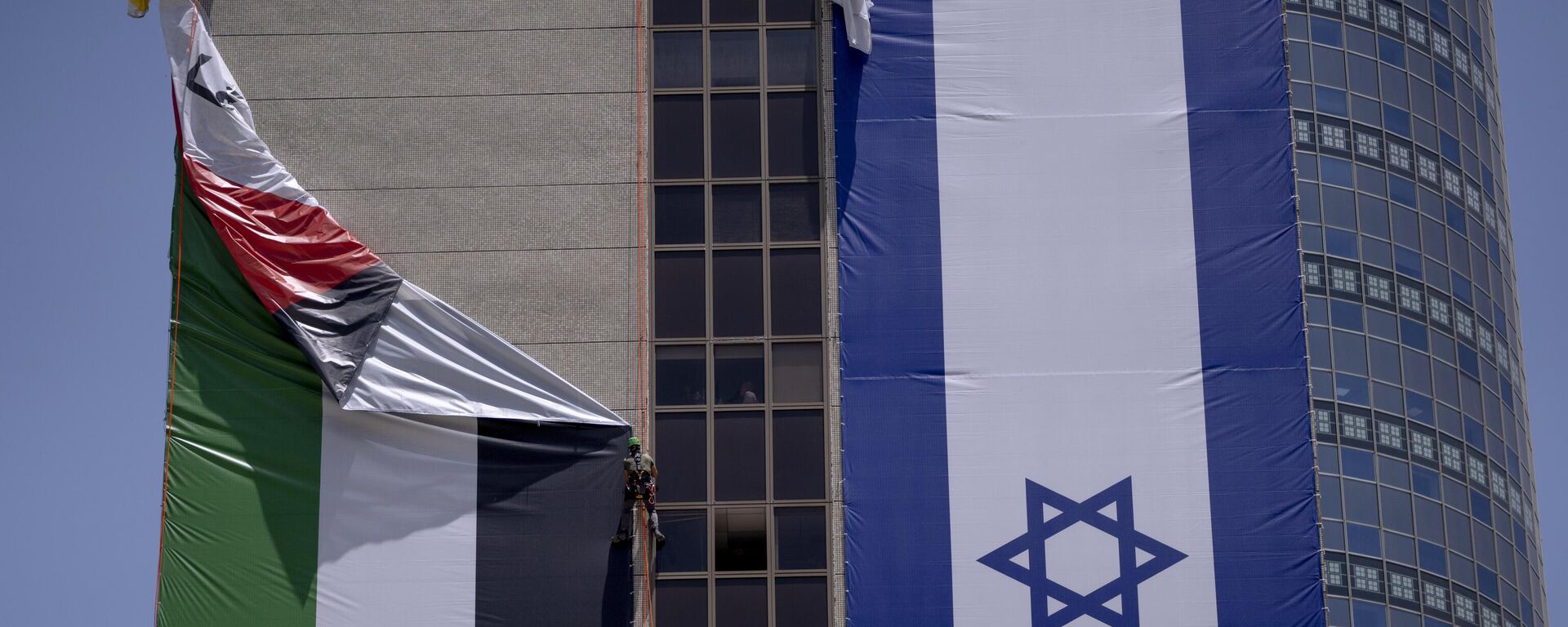https://sputnikglobe.com/20240216/iran-saudi-arabia-inch-closer-to-military-cooperation-as-us-loses-grip-in-mideast---analyst-1116815201.html
Iran, Saudi Arabia Inch Closer to Military Cooperation as US Loses Grip in Mideast - Analyst
Iran, Saudi Arabia Inch Closer to Military Cooperation as US Loses Grip in Mideast - Analyst
Sputnik International
Iran and Saudi Arabia could forge some sort of agreements, if not specifically military ones, then political ones related also to security and defense aspects, Mehmet Rakipoglu told Sputnik.
2024-02-16T09:02+0000
2024-02-16T09:02+0000
2024-02-16T09:02+0000
analysis
iran
saudi arabia
palestine-israel conflict
yemen
middle east
palestine
tehran
riyadh
hamas
https://cdn1.img.sputnikglobe.com/img/07e7/04/06/1109187523_0:91:1195:763_1920x0_80_0_0_d1214f88fa108a12be1a72698cc40e6d.jpg
Iran and Saudi Arabia could forge some sort of agreements, if not specifically military ones, then political ones related also to security and defense aspects, Mehmet Rakipoglu, a researcher on international affairs at Dimensions for Strategic Studies, a think tank based in the London, told Sputnik.“While there is currently no military cooperation between both countries,” he underscored, there could be “limited collaboration” linked to Yemen, as Saudi Arabia seeks a way out of its involvement in the civil war in that nation.Furthermore, if Saudi Arabia decided to “be part of a solution” in the Palestine -Israel conflict, Riyadh could “offer a new political form” to efforts to avoid a greater spillover of the violence.As part of the drive towards the restoration of diplomatic ties between the two Mideast rivals, launched last year, Iranian Defense Minister Mohammad Reza Ashtiani said on Tuesday that his country was ready to expand security and defense cooperation with Saudi Arabia. Ashtiani spoke during a meeting with Saudi Ambassador to Tehran Abdullah bin Saud al-Anzi, where he specified some of the areas in which the armed forces of the two countries could cooperate, including aspects such as the military, intelligence, and technology. He also voiced confidence that such cooperation would benefit both countries, while also boosting security and stability in the region.Ashtiani emphasized Iran's readiness for defense and security talks with Saudi Arabia and other Arab countries in the region, while also urging Muslim states to adopt a more coordinated stance towards Israel amid its war on Hamas in Gaza. For his part, the Saudi envoy emphasized the need to promote bilateral cooperation in different fields, including defense.As for the situation in Gaza, Saudi Arabia would restore diplomatic relations with Israel only if a Palestinian state is recognized within its 1967 borders with East Jerusalem as its capital and the conflict in the Gaza Strip is ended, the Saudi Foreign Ministry said in February."The Kingdom has communicated its firm position to the U.S. administration that there will be no diplomatic relations with Israel unless an independent Palestinian state is recognized on the 1967 borders with East Jerusalem as its capital, and that the Israeli aggression on the Gaza Strip stops and all Israeli occupation forces withdraw from the Gaza Strip," the ministry said in a statement.Military cooperation is critical for both countries, Mehmet Rakipoglu pointed out, adding that during the period before the normalization process started between Iran and Saudi Arabia, their problems were more related to security, especially for Riyadh.On March 10, 2023, Iran and Saudi Arabia announced that they had agreed to reestablish diplomatic ties after years of tensions. The two Middle Eastern powers signaled their intent to reopen their respective embassies and re-implement a 22-year-old security pact under which Tehran and Riyadh agreed to cooperate on issues related to terrorism, drug smuggling, and money laundering.“I don't think that there is going to be a big or huge, concrete military cooperation between both countries because Iranian-backed militias are still active in Yemen, in Syria, in Iraq, and also even in Gulf countries, in Bahrain, Saudi Arabia, East part of Saudi Arabia,” said Mehmet Rakipoglu. But the recent statements show that there is a willingness to negotiate and collaborate.As American influence in the Middle East and elsewhere in the world is waning, “Of course the US was bothered and was angry because the normalization process was held in China. So, it was obvious that the United States was not happy with that,” said Mehmet Rakipoglu. He pointed out that "if there is no tension and no conflict between Saudis and Iranians, there is no need for US to support Gulf countries."
https://sputnikglobe.com/20230905/iran-saudi-arabia-exchange-ambassadors-after-years-of-divisions-1113137947.html
https://sputnikglobe.com/20230407/chinas-saudi-iran-deal-indicates-us-no-longer-pulling-mideast-strings-1109246891.html
https://sputnikglobe.com/20240207/normalizing-saudi-israel-ties-requires-palestinian-state-recognition-1116634179.html
iran
saudi arabia
yemen
palestine
tehran
Sputnik International
feedback@sputniknews.com
+74956456601
MIA „Rosiya Segodnya“
2024
News
en_EN
Sputnik International
feedback@sputniknews.com
+74956456601
MIA „Rosiya Segodnya“
Sputnik International
feedback@sputniknews.com
+74956456601
MIA „Rosiya Segodnya“
china mediated deal iran and saudi arabia, saudi arabia and iran signed agreement in beijing, china reconciliation, us losing influence in middle east,
china mediated deal iran and saudi arabia, saudi arabia and iran signed agreement in beijing, china reconciliation, us losing influence in middle east,
Iran, Saudi Arabia Inch Closer to Military Cooperation as US Loses Grip in Mideast - Analyst
Diplomatic relations between Tehran and Riyadh resumed under a Chinese-brokered agreement last March, with the sides mulling even closer rapprochement after the escalation of the Palestinian-Israeli conflict last October amid attempts to prevent a regional spillover of the hostilities.
Iran and Saudi Arabia could forge some sort of agreements, if not specifically military ones, then political ones related also to security and defense aspects,
Mehmet Rakipoglu, a researcher on international affairs at Dimensions for Strategic Studies, a think tank based in the London, told
Sputnik.
“
While there is currently no military cooperation between both countries,” he underscored, there could be “
limited collaboration”
linked to Yemen, as Saudi Arabia seeks a way out of its involvement in the civil war in that nation.
Furthermore, if Saudi Arabia decided to “
be part of a solution” in the
Palestine -Israel conflict, Riyadh could “
offer a new political form” to efforts to avoid a greater spillover of the violence.
“Saudi Arabia and Iran can cooperate in Palestine for establishing a Palestinian state. This is something that they can work on together,” pointed out.
As part of the drive towards the
restoration of diplomatic ties between the two Mideast rivals, launched last year, Iranian Defense Minister Mohammad Reza Ashtiani said on Tuesday that his country was ready to expand security and defense cooperation with Saudi Arabia. Ashtiani spoke during a meeting with Saudi Ambassador to Tehran Abdullah bin Saud al-Anzi, where he specified some of the areas in which the armed forces of the two countries could cooperate, including aspects such as the military, intelligence, and technology. He also voiced confidence that such cooperation would benefit both countries, while also boosting security and stability in the region.
Ashtiani emphasized Iran's readiness for defense and security talks with Saudi Arabia and other Arab countries in the region, while also urging Muslim states to adopt a more coordinated stance towards Israel amid its
war on Hamas in Gaza. For his part, the Saudi envoy emphasized the need to promote bilateral cooperation in different fields, including defense.
As for the situation in Gaza, Saudi Arabia would restore diplomatic relations with Israel
only if a Palestinian state is recognized within its 1967 borders with East Jerusalem as its capital and the conflict in the Gaza Strip is ended, the Saudi Foreign Ministry said in February.
"
The Kingdom has communicated its firm position to the U.S. administration that there will be no diplomatic relations with Israel unless an independent Palestinian state is recognized on the 1967 borders with East Jerusalem as its capital, and that the Israeli aggression on the Gaza Strip stops and all Israeli occupation forces withdraw from the Gaza Strip," the ministry said in a statement.

5 September 2023, 18:15 GMT
Military cooperation is critical for both countries, Mehmet Rakipoglu pointed out, adding that during the period before the normalization process started between Iran and Saudi Arabia, their problems were more related to security, especially for Riyadh.
“Iran and Iranian-backed militias were perceived as a security threat... So when it comes to military cooperation between both countries, we see that they found ground to cooperate,” the pundit said.
The Houthi movement, which controls large parts of northern and western Yemen, vowed in November 2023 to attack any ships associated with Israel until it halts military actions in the Gaza Strip. This led US Secretary of Defense Lloyd Austin to announce the creation of a multinational operation to secure navigation in the Red Sea. US and UK forces later launched major strikes against Houthi positions in a bid to degrade the group's ability to target commercial vessels.
On March 10, 2023, Iran and Saudi Arabia announced that they had agreed to
reestablish diplomatic ties after years of tensions. The two Middle Eastern powers signaled their intent to reopen their respective embassies and re-implement a 22-year-old security pact under which Tehran and Riyadh agreed to cooperate on issues related to terrorism, drug smuggling, and money laundering.
“I don't think that there is going to be a big or huge, concrete military cooperation between both countries because Iranian-backed militias are still active in Yemen, in Syria, in Iraq, and also even in Gulf countries, in Bahrain, Saudi Arabia, East part of Saudi Arabia,” said Mehmet Rakipoglu. But the recent statements show that there is a willingness to negotiate and collaborate.
The international affairs analyst recalled how Washington was frustrated by the fact that the two regional powers had reached a China-brokered agreement in March to reopen their embassies. The deal became a major diplomatic victory in the Middle East for China, with pundits telling Sputnik at the time that it indicated the US was no longer pulling the strings in the Mideast region, which Washington had long regarded as its domain of influence. Furthermore, at the time, the move also blindsided Israel, which had been seeking its own normalization deal with Saudi Arabia in an effort to isolate its arch-rival Iran.
As
American influence in the
Middle East and elsewhere in the world is waning, “
Of course the US was bothered and was angry because the normalization process was held in China. So, it was obvious that the United States was not happy with that,” said
Mehmet Rakipoglu. He pointed out that "
if there is no tension and no conflict between Saudis and Iranians, there is no need for US to support Gulf countries."







